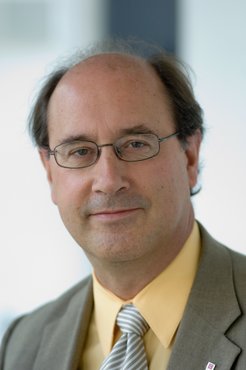Prof. Bernard F. Schutz becomes a member of the German Academy of Natural Scientists Leopoldina
Prof. Bernard F. Schutz, Director at the Max Planck Institute for Gravitational Physics (Albert Einstein Institute) in Potsdam-Golm will be admitted to the German Academy of Sciences Leopoldina at a ceremony today. The ceremony will take place during the annual conference of the Academy at 13:30 hrs at the International Congress Center Dresden. Schutz is honoured with admission to the Leopoldina for his outstanding services as a scientist.
Leopoldina
The German Academy of Natural Scientists Leopoldina, founded in Schweinfurth in 1652 and now based in Halle/Saale, is the oldest scientific-medical scholarly society in Germany. During the division of Germany, the Leopoldina was the only scientific organization that continued to exist as a unified entity. In age, importance and membership it is comparable to the Royal Society (Great Britain) or the Académie des Sciences (France). The Leopoldina sees its main tasks in the promotion of science, interdisciplinary discussion and the dissemination of scientific knowledge.
Outstanding scholars from all over the world are elected as members. In addition to natural scientists from Germany, Austria and Switzerland, a third of its members come from 27 other countries worldwide. Well-known members elected since 1922 from among Leopoldina members with outstanding services to science and the Academy include the physicists Lord Ernest Rutherford (1932), Max Planck (1941), Max Born (1958) and Werner Heisenberg (1968).
Bernard Schutz
enjoys an outstanding reputation worldwide due to its scientific activities, its publications, its personal commitment to the interests of gravitational physics and its scientists. He has been and still is the linchpin of fruitful collaboration between theoretical and experimental astrophysicists in Europe and the USA. He played a decisive role in the founding of the research field of gravitational wave astronomy, which is now undoubtedly one of the most forward-looking research fields with the commissioning of the German-British gravitational wave detector GEO600, the American LIGO detectors, the Italian VIRGO detector and, in the near future, the space project “LISA”.

Albert Einstein's theories inspired Bernard Schutz so much that at the age of 17 he was already determined to become a physicist. He studied physics at Clarkson University (State of New York/USA) in Potsdam (!). Together with a group of scientists at the California Institute of Technology (CalTech), he became aware of the importance of gravitational waves, which were an important prediction of Einstein's theory of general relativity, as early as the late 1960s. Since then, Schutz has been investigating the effects of general relativity on astrophysics. Due to his work in the field of theoretical astrophysics - including the calculation of gravitational wave signals and data evaluation of gravitational wave detectors - he is one of the leading international experts in the field of general relativity.
As founding director (together with Prof. Dr. Jürgen Ehlers), Schutz has been heading the fortunes of the Max Planck Institute for Gravitational Physics (Albert Einstein Institute) in Potsdam since the beginning in 1995. Within the institute, he heads the Department of Astrophysical Theory of Relativity, which deals with mathematical simulations of general relativity and studies of black holes and gravitational waves. He is also Professor at the Department of Physics and Astronomy, University of Wales in Cardiff. Together with two other scientists, Schutz is leading the work on the German-British gravitational wave detector GEO600 and is a member of the international scientific team of LISA (Laser Interferometer Space Antenna): a forward-looking joint project of ESA and NASA which is to detect gravitational waves in space from 2015 onwards. Bernard Schutz has also made it his mission to make gravitational physics, from Galileo to Newton and Einstein and current research, accessible to the general public. The e-journal Living Reviews in Relativity, which he founded, a freely accessible electronic journal with review articles from all areas of relativity theory, and his book “Gravity from the ground up”, published by Cambridge, are good examples of this.










